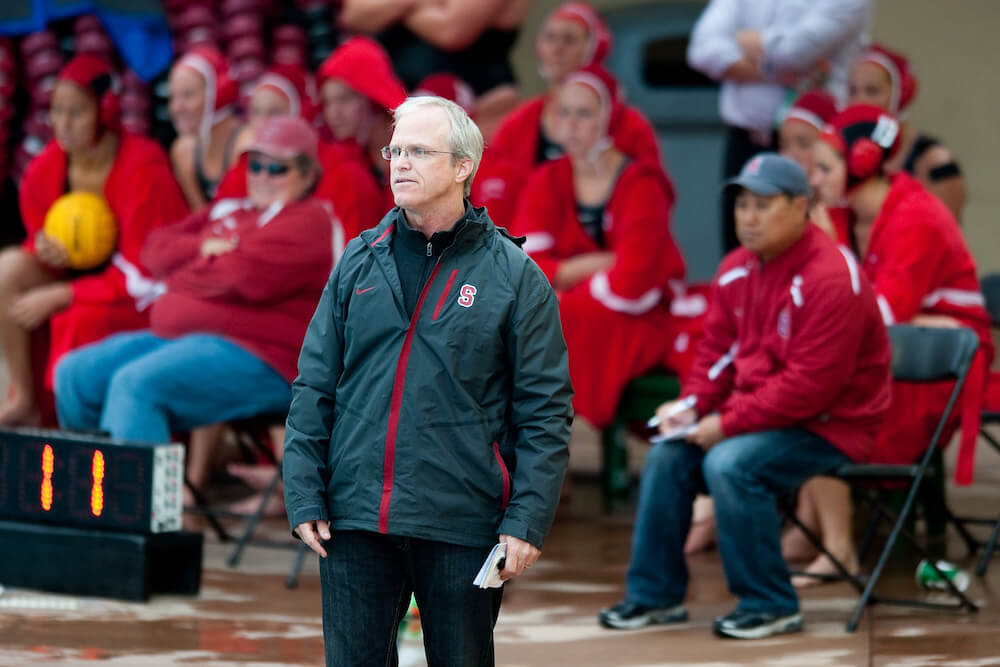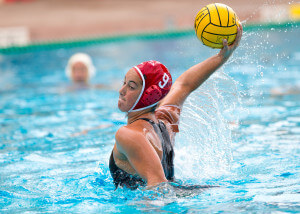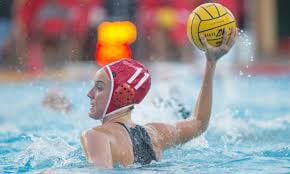MPSF Tournament Central: Catching Up With Stanford Coach John Tanner

LOS ANGELES, CA. When first meeting John Tanner, head coach for Stanford women’s water polo, it’s easy to be taken in by his calm demeanor, clear insights and a comfortable manner that immediately conveys friendship.
It’s likely that—given his team’s level of dominance the past two decades—Stanford opponents may not be so well-disposed towards the Cardinal helmsman.
One of the most successful coaches in Mountain Pacific Sports Federation (MPSF) history, over his 20 seasons at Stanford Tanner has a record of 499-73, a remarkable 872 win percentage. His team is the only one in the country to qualify for all 16 NCAA Championships, with a 17th virtually assured given the Cardinal’s record of 20-3 this season, including a 5-1 record in MPSF regular season play.
Stanford has been to seven consecutive NCAA finals, winning four of them, and sports a deep line-up of accomplished student athletes anchored by Olympians Maggie Steffens and Makenzie Fisher, and Gabby Stone of the U.S. National Team. According to the Stanford website, Tanner’s players have earned 169 ACWPC All-Academic selections, an astounding average of eight per season.
Following an MPSF Women’s Water Polo Tournament match against CSU Bakersfield—won 14-2 by Stanford, Tanner spoke with Swimming World about a 2017 season that saw the return of two-time Olympic gold medalist Steffens for her senior year, the Cardinal snap USC’s record 52-match win streak and perhaps some of the most competitive play in the history of American women’s water polo.
Stanford opened the season as the nation’s top team, got beat by USC last February at the Barbara Kalbus Invitational, snap the Trojan’s record 52-match win streak and then lose to UCLA the following week.
We knew it would be a big challenge—it always is—after the Olympics, and every Olympic cycle we’ve had multiple players stop out and come back. And the return from that experience is wonderful for the team and for all of us who involved in the sport. It does provide challenges in getting back into the rhythm of being a Stanford student.
And then we bring Makenzie Fischer who had deferred, and we had another senior who red-shirted last year in the hope of going to Rio [Gabby Stone]. It provides some wonderful opportunities because it’s adding this perspective but it’s challenging in that we had a very intense season last year under different circumstances.
So it definitely takes time to pull the group together.
I feel really great about where we are right now this weekend going into the post-season.

Maggie Steffens. Photo Courtesy: Stanford Athletics
Maggie Steffens returns for one final season at Stanford. What sort of impact does a two-time Olympic MVP have on your team?
Maggie’s influence goes so far beyond what she adds in terms of how she specifically plays. Her influence is vast; it will go way beyond her graduation, way beyond her last game because it goes way beyond what you see in games.
She is a leader in every sense of the word, and makes everyone around her better. Her contributions are so far beyond what you see when she’s in the game playing. It’s happening on the bench during games, happening before the games, when we’re getting ready to play and every day in training. Even when we’re in the training room, its in the way she goes about staying healthy, getting stronger. Her desire to get better every day makes her an incredible role model,
She’s also doing everything she can to lift others who aspire to improve. She is such a servant to our team and our program that I think we’ll be feeling her impact for many years.
What you describe sounds like the characteristics for what might define the nation’s best player. Yet it’s very well likely that despite perhaps the most spectacular credentials possible—back-to-back NCAA championships, two Olympic gold medals with the U.S. Women’s National Team, and the respect of all her peers and coaches—Steffens will not have won a Cutino Award in her four years at Stanford.
People who vote for awards are one small segment of any given enterprise. It’s the same with ours. If you were to ask anyone who’s been a teammate to Maggie what she has meant to them, the list of accolades would be huge—the list of her contributions would be limitless.
I think the praise they would have for her would go so far beyond any awards.
And she’s also absolutely not focused on that. She’s not at all driven by results but by each step along the way. She embraces that daily challenge and has the same enthusiasm at 6 o’clock in the morning in the weight room as she does with a minute left in a tie game.
Why may this be the year that Stanford wins a sixth NCAA title?

Makenzie Fischer. Photo Courtesy: Stanford Athletics
Makenzie Fischer is an amazing athlete who really is a wonderful component of our team. She can do everything. She’s a very good defender, very good scorer. As one of the youngest players on that Olympic team, when an opponent would call a timeout on a power play, she was called upon on defense.
That says a lot about her heart and her skill. She’s wonderful to coach.
The thing is that they came into a team that had played last year with great pride representing Stanford. You go top to bottom and a lot of people said: “Who is this person?”
They thrived last year in that environment and they will thrive as we get to these high-stakes games at the end of the season.
Gabby Stone is a fantastic goalie, Jordan Raney is a defender doing a lot for us at both ends of the pool. We’re getting great play from Dani Jackovic and Katie Dudley, who are both from the Midwest. They’re doing a wonderful job at the two-meter position.
Last year we had two freshmen who played for us a lot last year, Madison Berggren and Kat Klass and they continue to improve.
The thing I feel most strongly about with this team is that they just don’t look for excuses. They have over achieved in the classroom and in pursuing their post-Stanford lives. And they’re relentless in how they prepare for each game and each day.
What’s the mindset of your team when you faced USC on April 8 after they had administered one-goal losses to the Cardinal in the previous two meetings?
USC has great athletes, a great program. They play the game with great passion and skill. It’s a well-coached team.
We have great respect for them year in and year out but we’ve also had a lot of success against them—last year not nearly as much [USC beat Stanford in the 2016 NCAA title match].
For the most part our team was confident that they could handle what USC threw at us. We feel like we’re on an upward trajectory and if we just stayed within ourselves—really disciplined on defense and execute a little better on offense—we’d have a really good chance in that game.
And we also enjoy the atmosphere. It was really fun to come to L.A. and play them at their pool, with the band an all that comes with it.
We just felt very comfortable in that game on the biggest stage.
There’s a good likelihood that you will meet UCLA in the MPSF final. What’s your feeling about facing the Bruins again?
Another program that we have very deep respect for and have had success playing against. But we also know they’re a team that can play at an extremely high level and beat anyone anywhere.
It was a really great game at our place [a 10-9 Bruin win on April 15]. We feel we have what it takes to continue improving. We’re eager to have a chance to play them again.




Coach J.T.,I’ve watched them practice, seen them compete (lose/win). You have honed these women into a high caliber team.
Your methods are proven. . . . Good Luck in the N.C.A.A.’s